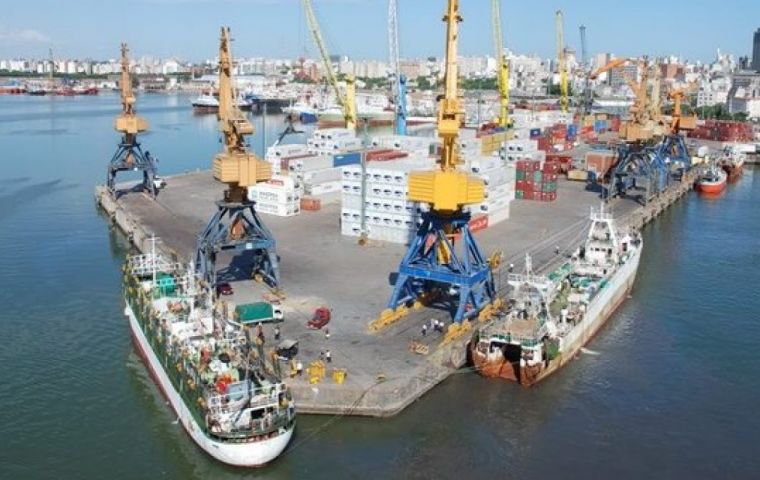MercoPress. South Atlantic News Agency
Another major haul of cocaine in the port of Montevideo: three tons headed for the Canary Islands
 Authorities found 101 packets of cocaine, with a street value of more than US$740 million, hidden in the rice cargo.
Authorities found 101 packets of cocaine, with a street value of more than US$740 million, hidden in the rice cargo. Uruguayan authorities this week confiscated over three tons of cocaine from an Africa-bound rice container in the port of Montevideo. The container was originally from Paraguay and was set to stop in Tenerife, the largest of Spain's Canary Islands off West Africa, before finally arriving in Cotonou, in southern Benin, the National Customs Directorate said in a statement.
Authorities found 101 packets of cocaine, with a street value of more than US$740 million, hidden in the rice cargo.
Stricter export control provisions were introduced at the Port of Montevideo just this week, authorities said. However media reports in Montevideo said the tip came from US DEA officials working in the region.
The drugs were discovered after being identified by a new scanner bought after a container ship that went through the port was found to have carried over four tons of cocaine in August.
German customs in Hamburg found and destroyed the cocaine aboard the container ship, which had set off from Montevideo and was heading to Antwerp in Belgium.
Earlier in the year an aircraft that landed in France was also caught with 600 kilos of pure cocaine. The aircraft apparently left Carrasco airport in Montevideo, with no customs or cargo checking.
It is time Uruguay faces the challenges of internationally networked drug trafficking, Uruguayan security advisor Robert Parrado said at the time to the German media, pointing out the country has always been a transit hub for drugs.
“This huge cocaine find in Hamburg reveals the serious shortcomings of border and customs controls in Uruguay,” he said, arguing that the problem has been neglected by politicians for years.
“Unfortunately, the country does not have a special unit with specially trained personnel dedicated to the investigation of serious crimes such as drug trafficking, arms trafficking or human trafficking,” Parrado said.
Last July an Italian organized crime boss known as the Cocaine King of Milan escaped over night from his cell at Montevideo police headquarters where he was awaiting extradition to Italy.
Rocco Morabito and three other inmates made a brazen escape from the prison in Montevideo, climbing through a hole in the roof of the building. Reports from the Home ministry indicated that the men eventually broke into a neighboring property, asked for money from the owner, then fled.
However one of the four men, a Brazilian also waiting to be extradited to his home country, actually avoided the hassle of the daring jailbreak by simply walking through a side door of the building “without anyone stopping him.”
Morabito, who is believed to be the son of another famed mobster with the same name, was one of the 10 most wanted criminals in the world in 2017 as the leader of the Calabrian 'Ndrangheta, one of Italy's most powerful organized crime groups.
The escape was only noticed in the morning during the apparent change of guard.
Uruguayan Home/Interior Minister, Eduardo Bonomi, was unable to be located for a couple of days after the escape, and despite the domestic and international repercussions of the escape remains in his job.




Top Comments
Disclaimer & comment rulesCommenting for this story is now closed.
If you have a Facebook account, become a fan and comment on our Facebook Page!